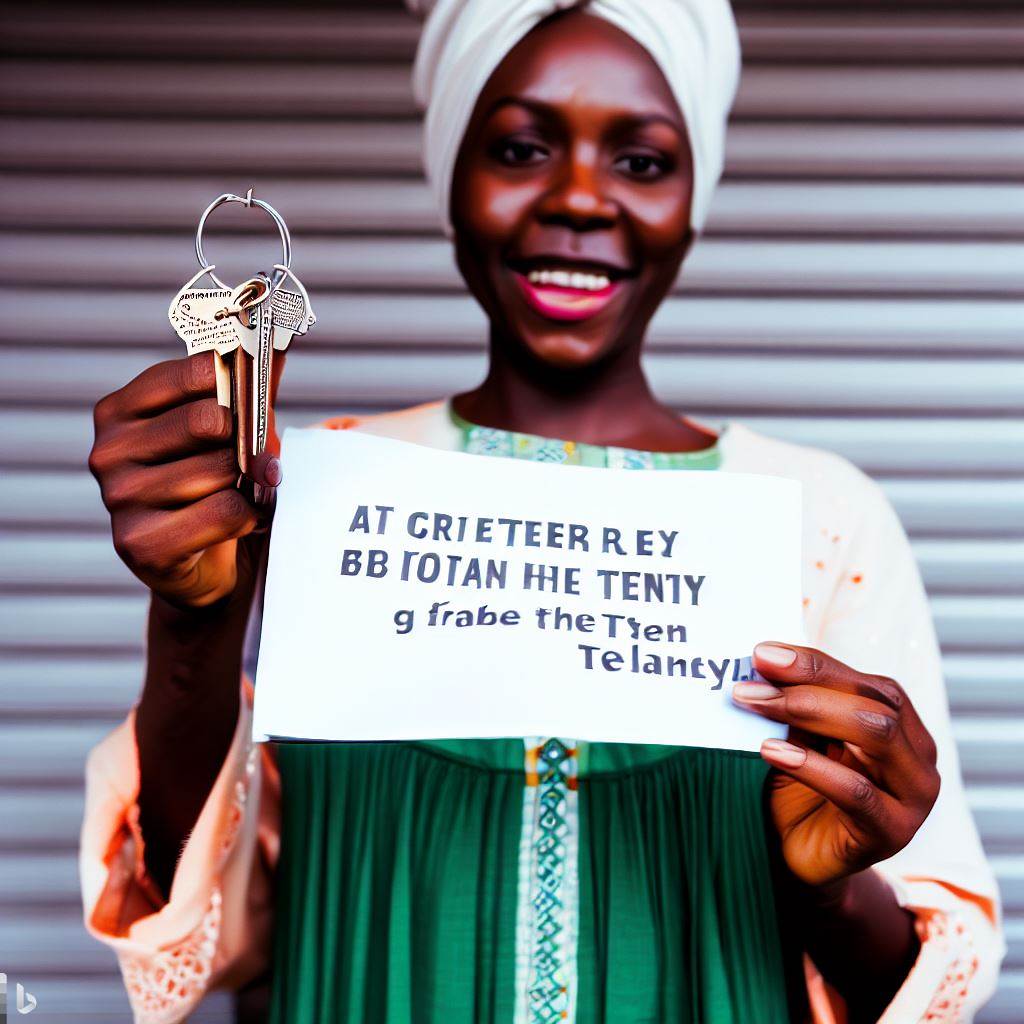From Tenant to Homeowner: A Nigerian’s Journey
Last Updated on July 22, 2023
Introduction
Going from a tenant to a homeowner is a significant journey for Nigerians. Owning a home is a symbol of stability, security, and success in Nigerian society.
It signifies a sense of achievement and provides a solid foundation for building a future.
This article explores the process and challenges faced by Nigerians in transitioning from being a tenant to becoming a homeowner.
It sheds light on the importance of this journey and the impact it has on individuals and communities.
As we delve into this topic, we will gain insight into the aspirations and dreams of Nigerians and how they strive to achieve them despite the obstacles they encounter.
The journey from tenant to homeowner is not just about acquiring property; it represents a transformation in mindset, financial planning, and long-term investment.
We aim to inspire and educate readers about the steps involved in this journey and the rewards that come with it.
The Rental Culture in Nigeria
- The prevalent culture of renting homes in Nigeria: Renting homes is the common practice in Nigeria, with a significant majority of the population opting for renting rather than owning a home.
- Reasons behind this culture: Changes in job markets have led to increased mobility and uncertainty, making renting a more flexible option. Urbanization has resulted in a growing demand for housing, making renting more accessible and convenient.
- Challenges faced by tenants: Tenants in Nigeria face various challenges. One primary concern is the rising rents, which often become unaffordable for many individuals and families.
- Limited control over the property: Tenants often face restrictions on customization and modification of the rented property, making it difficult to create a personalized living space.
- Lack of long-term stability: The rental culture in Nigeria deprives tenants of long-term stability and the sense of permanence that comes with homeownership.
- Financial constraints: Renting homes can also put significant financial strain on individuals and families.
- Insecurity: Tenants may also experience insecurity regarding their living situation. They may be subjected to sudden eviction or disputes with landlords, which can disrupt their lives and cause emotional and financial distress.
- Dependency on landlords: Renters in Nigeria often rely on their landlords for maintenance and repairs.
- Lack of ownership benefits: Renting deprives individuals of the benefits of homeownership, such as building equity, property appreciation, and the ability to customize and personalize their living space according to their preferences.
- Social stigma and perception: Owning a home is often seen as a symbol of success and stability, while renting may be associated with transience or financial difficulties.
Despite these challenges, renting continues to be the preferred housing option for many Nigerians, and addressing the issues faced by tenants is crucial for improving the overall housing situation in the country.
Read: Achieving Home Ownership in Nigeria on a Low Income
Motivations to Become a Homeowner
Aspiring to become a homeowner is a common ambition among Nigerians due to various compelling reasons:
- Financial Security: Owning a home offers stability and protection against inflation and rising rental costs.
- Investment Opportunities: Real estate is considered a valuable asset that appreciates over time, providing potential for financial gains.
- Sense of Ownership: Homeownership instills a sense of pride, accomplishment, and a feeling of belonging to a community.
- Cultural Factors: Nigerian culture places great importance on owning property as a symbol of success and social status.
- Societal Pressure: Society often perceives homeownership as a significant milestone and expects individuals to achieve it.
- Family Legacy: Acquiring a home allows Nigerians to leave an inheritance for their children and future generations.
- Property Control: Homeownership grants individuals the freedom to modify and personalize their living space according to their preferences.
- Tax Benefits: Owning a home can provide tax advantages through deductions and exemptions, reducing overall tax liability.
- Renting Disadvantages: Many Nigerians view renting as a waste of money, as monthly payments do not contribute to building equity.
- Long-Term Stability: Owning a home provides a sense of security and eliminates the uncertainty associated with rental agreements.
- Privacy and Freedom: Homeowners enjoy more privacy and independence compared to living in rental properties.
- Retirement Planning: Owning a home ensures a shelter even after retirement and reduces the financial burden during old age.
The motivations for becoming a homeowner in Nigeria are deeply rooted in the desire for financial well-being, social status, and a sense of belonging.
The quest for financial security drives many Nigerians to invest in real estate, recognizing the potential for long-term financial gains.
By owning a home, individuals can protect themselves against inflation and rising rental costs, ensuring stability in their financial lives.
Moreover, homeownership offers a tangible sense of ownership and belonging. It symbolizes personal success and societal recognition, aligning with the cultural values present in Nigerian society.
The pressure to achieve this milestone stems not only from personal aspirations but also from societal and family expectations.
Property ownership is seen as a way to establish a family legacy and provide a secure future for subsequent generations. It grants individuals the liberty to control and customize their living spaces, fostering a sense of pride and satisfaction.
What’s more, homeownership offers several practical advantages. Tax benefits such as deductions and exemptions help reduce the financial burden, making it an attractive option for many Nigerians.
Renting, on the other hand, is perceived as an inefficient use of money, as it does not contribute towards building equity or long-term stability.
Owning a home provides the peace of mind and freedom that may not be afforded by rental properties. Homeowners can enjoy privacy, make modifications according to their preferences, and establish a strong community presence.
The motivations for becoming a homeowner in Nigeria are multi-faceted and deeply ingrained in cultural, financial, and societal factors.
Financial security, investment opportunities, a sense of ownership, and cultural expectations all contribute to the strong desire for homeownership among Nigerians.
Read: Understanding Home Appreciation in Nigeria’s Real Estate
Challenges of Transitioning from Tenant to Homeowner
Transitioning from being a tenant to becoming a homeowner is a significant milestone in anyone’s life. However, for Nigerians, this journey is often fraught with numerous obstacles and challenges.
Let’s discuss the various hurdles faced by Nigerians in making this transition, including financial constraints, lack of affordable housing, bureaucratic procedures, and the impact of corruption and fraudulent practices in the real estate market.
Financial Constraints
One of the major challenges faced by Nigerians when transitioning from tenant to homeowner is the financial burden associated with homeownership.
Many individuals struggle to save enough money for a down payment, as well as the additional costs such as legal fees, taxes, and insurance.
The lack of affordable mortgage options further exacerbates this issue. High-interest rates and strict eligibility criteria make it difficult for Nigerians to obtain loans and enter the housing market.
As a result, many aspiring homeowners are forced to delay their dreams or settle for substandard housing options.
Lack of Affordable Housing
An acute shortage of affordable housing is another significant challenge that Nigerians face in their journey from tenant to homeowner.
The demand for housing far exceeds the available supply, driving up prices and making it unaffordable for the majority of citizens.
The lack of affordable housing options also contributes to overcrowding, as families are forced to live in cramped spaces or informal settlements.
This not only compromises their quality of life but also hampers their ability to save and invest in homeownership.
Bureaucratic Procedures
The bureaucratic procedures involved in purchasing property in Nigeria can be complex, time-consuming, and frustrating. Obtaining all the necessary documentation, including land titles and building approvals, can be a daunting task.
The inefficiency and corruption within government agencies responsible for property registration further compound the problem.
Endless delays, demands for bribes, and inconsistencies in the process create a significant barrier for Nigerians trying to become homeowners.
Impact of Corruption and Fraudulent Practices
The real estate market in Nigeria is plagued by corruption and fraudulent practices, which have a detrimental impact on aspiring homeowners.
Land grabbing, forged documents, and double sales are just a few examples of the prevalent scams in the industry.
Corrupt practices not only deceive unsuspecting buyers but also undermine the legal system.
Victims of fraud often struggle to recover their investments, and the lack of trust in the real estate sector deters potential buyers from entering the market.
In a nutshell, transitioning from tenant to homeowner is a challenging process for Nigerians due to various obstacles.
Financial constraints, lack of affordable housing, bureaucratic procedures, and the impact of corruption all contribute to the difficulties faced by aspiring homeowners.
Addressing these challenges requires a comprehensive approach, including government intervention to provide affordable mortgage options, streamline bureaucratic procedures, and enforce stricter regulations to combat corruption.
Only through these efforts can Nigerians truly realize their dream of homeownership and create a more equitable housing market for all.
Read: Estate Planning for Your Retirement in Nigeria
Strategies for Navigating the Journey to Homeownership in Nigeria
Becoming a homeowner in Nigeria can be an exciting and fulfilling journey. However, it requires careful planning, saving, and research. Here are five strategies to help you navigate this important milestone:
1. Set Clear Goals:
It is crucial to define your homeownership goals early on.
Determine the type of property you want, the location, and any specific features or amenities you desire. Having clear goals will guide your decisions and help you stay focused.
2. Create a Budget:
Developing a budget is essential to understand your financial capabilities and set a savings target.
Take into account your current income, monthly expenses, and other financial obligations. This will help you identify areas where you can cut back and save more effectively.
3. Save for a Down Payment:
Saving for a down payment is one of the most significant challenges when becoming a homeowner.
Set a realistic savings goal and start setting aside a portion of your income towards this goal. Consider automating your savings to ensure consistency.
4. Do Thorough Research:
Before making any property purchases, conduct extensive research.
Familiarize yourself with the real estate market trends, property values, and the legal processes involved.
This knowledge will empower you to make informed decisions and avoid potential pitfalls.
5. Seek Professional Assistance:
Navigating the real estate market can be complex, especially for first-time buyers. Consider seeking professional assistance from real estate agents, mortgage brokers, or legal experts.
They can provide valuable guidance, negotiate on your behalf, and ensure a smooth transaction.
Becoming a homeowner is a significant achievement, and these strategies will help you on your journey in Nigeria.
Remember, careful planning, saving, and seeking guidance are key to making this dream a reality. Take the necessary steps now and embark on the path towards homeownership with confidence!
Read: Exploring Retirement Housing Options in Nigeria

Government initiatives and policies
Government initiatives and policies play a crucial role in facilitating homeownership for Nigerians. These initiatives aim to make housing more affordable and accessible to the general population.
Let’s discuss the government’s role in facilitating homeownership, explore existing initiatives, such as mortgage schemes and affordable housing programs, analyze their effectiveness, and understand the challenges they face.
Government’s role in facilitating homeownership
The Nigerian government recognizes the importance of homeownership in achieving social stability and economic growth.
They have implemented various initiatives and policies to address the housing deficit in the country.
These initiatives are designed to provide financial assistance and create an enabling environment for Nigerians to own homes.
One of the main responsibilities of the government is to establish a robust legal and regulatory framework that governs the housing sector.
This framework ensures that homeownership transactions are secure and transparent, providing confidence to both buyers and sellers. It also helps in minimizing disputes and protecting the rights of homeowners.
Existing initiatives and their effectiveness
The government has launched mortgage schemes to make homeownership more affordable for Nigerians.
These schemes provide long-term loans with lower interest rates, extended repayment periods, and flexible payment options.
This allows individuals to finance their homes over an extended period, reducing the burden of high upfront costs.
Another initiative is the creation of affordable housing programs. These programs aim to develop housing units that are within the reach of low and middle-income earners.
The government collaborates with private developers and financial institutions to subsidize the cost of construction, making these homes more affordable.
While these initiatives have made strides in increasing homeownership rates, there are still challenges that need to be addressed. One major challenge is the limited availability of affordable land for housing development.
The government needs to release more land for housing projects and streamline the land acquisition process to ensure a steady supply of housing units.
Moreover, the cumbersome and time-consuming process of obtaining mortgage loans poses a challenge to potential homeowners.
There is a need to simplify and expedite the mortgage application process while ensuring proper due diligence to protect against default risks.
However, there are still several challenges that need to be addressed. The government must focus on increasing the availability of affordable land, streamlining the mortgage application process, and providing better access to financing options.
By effectively tackling these challenges, the government can further enhance homeownership rates and contribute to the overall development of the country.
It is crucial for the government to continue reviewing and improving its initiatives and policies to ensure that homeownership becomes a reality for more Nigerians.
Only then can the country truly progress towards achieving sustainable development and inclusive growth.
Success stories and testimonials
Success stories and testimonials are powerful tools that can inspire and motivate others on their journey towards becoming homeowners.
In Nigeria, many individuals have successfully transitioned from being tenants to proud homeowners, and their stories serve as a testament to what is possible with determination and hard work.
One success story comes from Mr. Akintola, a middle-aged man who had been a tenant for most of his adult life. Tired of paying rent and having nothing to show for it, he decided to take matters into his own hands.
Through careful financial planning and disciplined saving, Mr. Akintola was able to accumulate enough funds to purchase his own home.
Today, he proudly invites guests to his beautifully furnished house and shares his journey of homeownership with anyone who is willing to listen.
Another inspiring story is that of Mrs. Adekunle, a single mother who struggled to make ends meet.
She worked multiple jobs and faced numerous challenges, but she never gave up on her dream of owning a home. With the support of her friends and family, Mrs. Adekunle was able to secure a mortgage and purchase a modest yet cozy house.
Her story serves as a reminder that homeownership is attainable, even in the face of adversity.
In addition to these individual success stories, there are also testimonials from various individuals who have successfully transitioned from tenants to homeowners.
These testimonials highlight the financial benefits of homeownership, such as the ability to build equity and enjoy tax advantages.
Many also mention the sense of pride and accomplishment that comes with owning a home, as well as the freedom to customize and personalize their living space.
These success stories and testimonials can serve as sources of inspiration and motivation for those who are still on their journey towards becoming homeowners.
They show that with proper planning, determination, and support, anyone can achieve the dream of homeownership. They remind us that the path to homeownership may not always be easy, but it is undoubtedly worth it in the end.
For those who are still renting and dreaming of owning their own home, these stories offer a glimpse of what is possible. They demonstrate that it is never too late to start saving and planning for the future.
They encourage individuals to take control of their finances, seek professional advice, and explore different avenues for homeownership, such as mortgage programs and government assistance.
Generally, success stories and testimonials from Nigerians who have successfully transitioned from tenants to homeowners are powerful tools that can inspire and motivate others.
These stories highlight the financial benefits, sense of pride, and personal fulfillment that come with homeownership. They remind us that with determination, hard work, and support, anyone can achieve the dream of owning their own home.
So let these stories serve as a beacon of hope for those still on their journey, for the road to homeownership is waiting for you to embark upon it.
Conclusion
We have discussed the journey of a Nigerian from being a tenant to becoming a homeowner. Throughout the article, we highlighted the challenges and sacrifices involved in this process.
We also emphasized the significance of homeownership, not just for individuals but also for society as a whole.
Owning a home provides stability, security, and a sense of belonging. It also allows individuals to build equity and wealth for themselves and their families.
We encouraged readers to take steps towards achieving their goal of becoming homeowners. This can be done by saving money, exploring different financing options, and seeking professional advice.
Becoming a homeowner is a major accomplishment that should not be underestimated. It requires determination, patience, and hard work, but the rewards are worth it.
We hope that through this article, readers have gained valuable insights and are inspired to pursue their dreams of homeownership. Remember, it is possible to turn the dream of owning a home into a reality.


